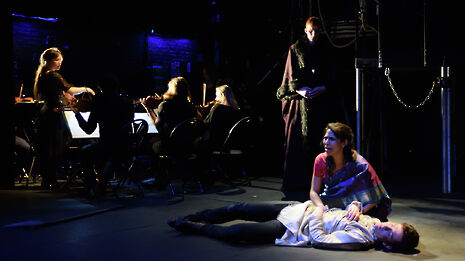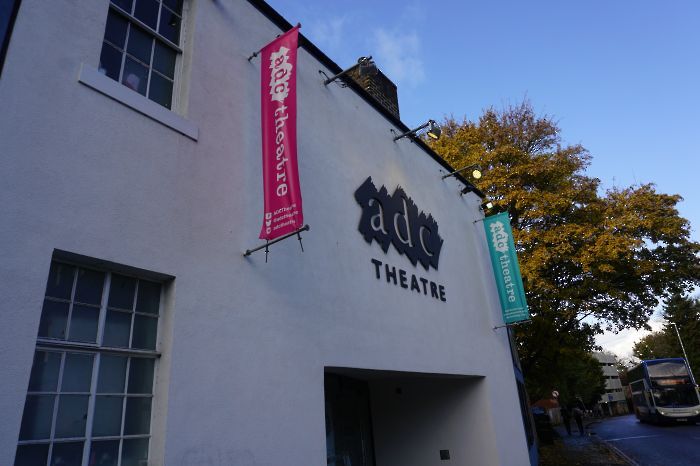Savitri review: ‘a concise, accessible and enjoyable lateshow’
Matt Coote enjoys CUOS’s “carefully crafted and skillfully executed production” of Savitri.

In spite of the genre’s stereotypical pretentious air and haughtiness (at least I’ve found that where I’m from), opera, when well-done, can impart an emotional range and depth to even the most compact, concise stories. Sāvitri is certainly brief in outline. The eponymous heroine (Parvathi Subbiah) confronts Death (James Quilligan) following his visitation upon her husband Satyavān (James Micklethwaite). Holst’s opera, drawn from Sanskrit epic, the Mahābhārata, tells how Sāvitri outwits death and wins back her husband’s life.
You might think that opera only just beginning after bedtime is a bad idea, but this tale is a digestible morsel, and this Sāvitri, which is a carefully crafted and skillfully executed production, makes the brief episode a delectable one, too. Though in the costume department it perhaps struggles to keep pace with the steampunk aesthetic and eye-catching futurism of CUOS’s previous production, Radamisto, which was performed earlier this term, Sāvitri has a style all of its own: arcane and ethereal.
“A dramatic force”
A darkened theatre in silence, broken only by the voice of “the law that no man breaketh” establishes a macabre tone at the outset, which the imposing physical presence of Quilligan emphatically sustains. This is the mood to which Sāvitri is the foil, and Subbiah’s striking and contrasting stature served to reinforce the emphasis, placed by Holst’s vocal writing, upon the opposed forces of life and death represented by their characters. She was a dramatic force equal to her counterpart, Death, and the emotional turmoil of Sāvitri as her unwitting husband drew closer to his dying moment was an early and particular highlight. The return of Satyavān to life was tenderly handled, in a performance which, though the most brief of the principals, brought out both the valour and affections of his character.
“Its life-affirming message makes this production particularly appropriate for a week five lateshow”
In combination with the orchestra, the wordless chorus of female voices occasionally overshadowed the clarity of soloists; nevertheless the support which both provided to a minimalist cast of main characters amplified the dramatic impact of the whole. The encroachment of the orchestra on stage right did not compromise their complementarity with the vocalists; the clustering of the shrouded chorus about Satyavān, overcome by death, lent balance to a space that could easily have become dominated by a constant orchestral presence. When they were on stage, the costume and movement of the chorus underlined the transcendent quality of the narrative. Its life-affirming message makes this production particularly appropriate for a Week Five lateshow.
Naomi Woo, the musical director, displayed a pervasive control over the performance space, which extended from the wings to the height of the scaffold dominating centre stage, and even to the back of the ADC. Leaving aside the curtain call, which lacked a little polish, in this production the considered direction (Judith Lebiez) and management of a talented cast and crew offers up operatic range in a concise, accessible and enjoyable lateshow.
Sāvitri is being performed at the ADC at 11pm until Saturday night, with Anna-Luise Wagner playing Sāvitri on the Thursday and Saturday performances
 Interviews / ‘People just walk away’: the sense of exclusion felt by foundation year students19 April 2024
Interviews / ‘People just walk away’: the sense of exclusion felt by foundation year students19 April 2024 News / Climate activists smash windows of Cambridge Energy Institute22 April 2024
News / Climate activists smash windows of Cambridge Energy Institute22 April 2024 News / Copycat don caught again19 April 2024
News / Copycat don caught again19 April 2024 News / John’s spent over 17 times more on chapel choir than axed St John’s Voices22 April 2024
News / John’s spent over 17 times more on chapel choir than axed St John’s Voices22 April 2024 News / Fitz students face ‘massive invasion of privacy’ over messy rooms23 April 2024
News / Fitz students face ‘massive invasion of privacy’ over messy rooms23 April 2024






